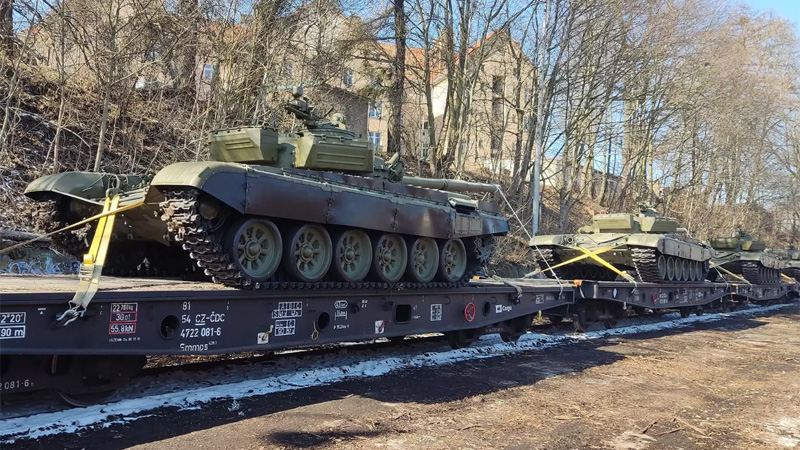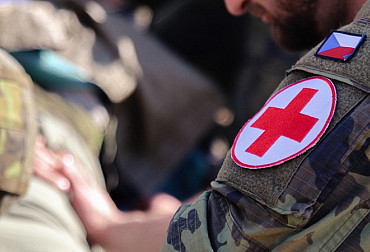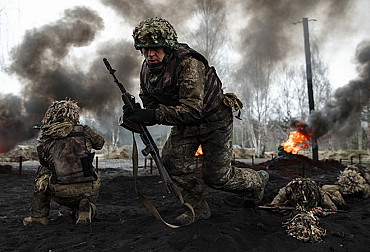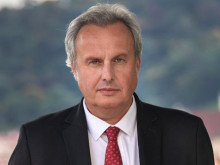Jana Černochová: Modernisation of the Czech Armed Forces and aid to Ukraine must continue
The Czech Republic, which holds the Presidency of the Council of the EU from 1 July to the end of this year, last held the Presidency in the first half of 2009. The presidency of the Council of the EU is one of the most important rights and most demanding tasks of EU membership. The role of the presidency is not only organisational, but also mediating, political and representative. It is not only in connection with the Presidency that we asked Minister of Defence Jana Černochová for an interview.
 Picture: Minister of Defence Jana Černochová | Jan Schejbal
Picture: Minister of Defence Jana Černochová | Jan Schejbal
What are the challenges that await us during the Czech Presidency of the Council of the EU in the area of defence?
First and foremost is the security situation after Russia's barbaric aggression against Ukraine. The illusion of peace is definitely over, we must urgently help Ukraine and strengthen our, European and Alliance defence capabilities.
First and foremost is the security situation after Russia's barbaric aggression against Ukraine. The illusion of peace is definitely over, we must urgently help Ukraine and strengthen our, European and Alliance defence capabilities.
EU Defence Minister is a very misleading abbreviation, the country holding the Presidency does not run the European Union, but thanks to this position it has the chance to put some priorities on the table. I think the war will unfortunately continue for some time and nobody has a plan for peace yet, although we all want it. Unfortunately, it depends on the erratic actions of the Russian Federation. The Czech Republic certainly has a very strong informal role, not least because of our quick and clear action from the start of the conflict, which is appreciated by all the allies. The Prime Minister's authority has also been strengthened by his trip to Kiev at a time when this was not yet common. Certainly, our historical experience also plays a big role, because many things that are commonplace in the countries of the former Eastern bloc are difficult to communicate to countries that were west of the Iron Curtain. Our role is to explain that Russia really is not and was not a 'buddy', which some countries are only now really realising.
In your speech at the Armed Forces Day ceremony, you referred to the work to link the EU and NATO. What can we do for this as a presidency country?
The Union and the Alliance are two essential pillars for our free existence, so they need to communicate as much as possible and, as far as possible, not duplicate or interfere with each other. Our priority is to deepen cooperation between the EU and NATO so that the defence capabilities of European countries are effective and the two organisations complement each other well. I certainly do not have the ambition to merge NATO and the EU into some kind of cat and mouse; this is not about merging, but about finding intersections in their agendas.
How can the Czech Republic contribute to the development of new defence capabilities?
The Czech Republic has a well-developed defence industry and we have a lot of companies here that are doing cutting-edge things. And let's not forget academia, the University of Defence, but also experts from other universities. Drones, space technologies, robotics... We have great experts in the army or, for example, in the NCIB, who are working on new battlefields such as space or cyberspace.
Czech industry can offer new solutions in the field of cyberspace or space projects. In your opinion, is there room within the Presidency to present these capabilities to other Member States?
Absolutely. In July, there was an expert conference as part of the Presidency events, where companies and experts could present these capabilities and present the possibilities of accessing breakthrough technologies in the framework of building defence capabilities. And it doesn't stop there, we will always be reminded of this area, because it is thanks to technology that we maintain the West's lead against Russia. We also presented the latest technologies during the informal meeting of EU Defence Ministers in Prague at the end of August.
In your opinion, does the EU realise the need to reclassify the arms industry taxonomy in a way that does not weaken the Union's defence capability? What can we do within the framework of our presidency?
For a long time it was not aware of it, but after 24 February the strategic importance of the arms industry became strongly recognised by the Member States, including on this issue. However, it will still take a lot of effort to convince the European authorities. During our Presidency of the Council of the EU, we are ready to constantly highlight this issue.
Can we, as the presiding country, influence the involvement of Czech companies in European arms production?
The best way to support Czech arms companies is to open up new opportunities for them to participate in Ministry of Defence projects and allow them to present themselves on EU and Alliance soil so that they have references. Supporting our defence industry is a priority for this government. But it is also up to our armourers to compete with others.
Minister, at the beginning of your mandate, you mentioned the so-called ' Ten Commandments for Defence' as part of the MoD's priorities. Have these priorities changed in any way in view of the current war in Ukraine, which has been going on for over six months?
Unfortunately, the war in Ukraine has confirmed that the Ten Commandments have indeed identified the key problems of our defence. I would not change anything about it!
One of the fundamental changes within the framework of the Ten Commandments for Defence was a change or modification of legislation. Will it be possible to amend the Public Procurement Act so that it does not block the smoothness and speed of army purchases, or will the ministry under your leadership rather opt for the government-to-government option?
Both. For large strategic procurements such as supersonic aircraft or tracked infantry fighting vehicles, it is better to use the government-to-government model; the tender for infantry fighting vehicles, which we cancelled, is a deterrent for me. The process was so complex and opaque that we might never see the IFVs. But there are dozens of other acquisitions and projects in the ministry that obviously have to be competed. However, the process needs to be faster, more efficient and lead to a positive goal to get anything bought at all, so yes, we are trying to convince the promoter of the Public Procurement Act, the Ministry of Regional Development, that change is needed and I believe we will see it. But it is not just about the Public Procurement Act. We are also working on wider changes to defence legislation, including a new Defence Finance Act.
Stepping up the modernisation of the equipment that our army is now working with has been very topical recently, thanks to events in Ukraine. Can you tell us what you think our army needs as a priority?
Everything! The internal debt is huge. Supersonics, IFVs, tanks, helicopters. Modernization of infrastructure, targeted recruitment of soldiers, because having quality and well-trained personnel (soldiers) to operate the equipment is as important as the equipment itself. And modernisation must be well thought out, because everything is connected. It is impossible to single out one thing. When you buy aircraft, you need somewhere to put them, you need ammunition for them, infrastructure, trained personnel.

The government has entrusted you to negotiate with the US to buy supersonic fighters, wouldn't it be better to keep the Swedish Gripen, given the infrastructure requirements?
The government made the decision based on the recommendation of the military, which considers it most advantageous in the long run to acquire the 5th generation aircraft, i.e. the F-35. We must not look at the whole thing only in terms of this year or next year. We are talking about securing national defence for at least the next 30 years. And it is the 5th generation aircraft that will dominate the skies after 2035 and 2040. No one can convince me that our country and our military don't deserve the best for their defense. There are many myths in the public domain about supersonic aircraft, and one of them is that it would cost almost nothing to keep the Gripen. Even the most advanced Gripens would have to be bought, and they are certainly not fundamentally cheaper than the F-35. But most importantly, we're going to have to modify the infrastructure no matter what aircraft we operate, because our allies are now ordering F-35s in bulk and we can't tell them they can't land with us. I'm sorry that the debate is that the Gripen is bad and the F-35 is expensive. It isn't. The Gripen is a very good aircraft, and our soldiers are proving that they can perform the current tasks with it. But technology is changing the world, including the battlefield, and we need to move on to ensure that we can secure our country's defence and maintain our technological dominance in the decades to come.
Critics of the government's approach claim that you made a hasty decision and ignored the Swedish offer...
First of all, no offer has yet arrived at the Ministry of Defence, not even the Swedish Defence Minister offered me anything at our meeting in Madrid. And this was at a time when the Swedish ambassador was talking to the Czech media about an offer. We were purely based on the military recommendation that was commissioned by the Babiš government in 2019. And neither I nor my colleagues changed a single line on that recommendation. According to it, the best and most advantageous aircraft for the Czech Republic is the 5th generation aircraft in the number of 24 units, which is the same number that was already envisaged twenty years ago when the Gripen purchase was planned at that time. By the way, if you look at the bond programme that was passed by the House of Commons at the time and which was supposed to pay for the purchase, you will see that the amount of CZK 58.5 billion was envisaged for the purchase of 24 JAS 39 Gripen aircraft. In any case, the latest Gripen E aircraft are still 4.5 generation aircraft that will struggle to meet the demands that will be asked of them from 2040 onwards.
That's still 20 years
Seems like an awfully long time, but we're talking about acquiring aircraft at the end of this decade, if they were morally obsolete a decade later, the government would have to address the future of supersonics again in the early 30s. And it would then have to buy new 5th generation machines, adapt the infrastructure to them, train the pilots. Plus, Europe is transitioning to the F-35, which will also be landing here, so we have to adapt the infrastructure to them anyway. It seems to me more logical and economical to do it all at once and properly - with a view to several decades ahead. By the way, according to some estimates, there should be 500-600 F-35s in Europe in 2030, which as a NATO member state we cannot ignore.
Experts talk about the multiple costs of operating the F-35...
These are often comparisons of incomparable numbers. For example, there is no uniform methodology for calculating the cost of a flight hour. It usually involves different indicators. Therefore, it is very necessary, when comparisons are made, to pay attention to the methodology, and that is usually lacking for those numbers flying through space. I cannot give details because the analyses are mode-based, but I can assure everyone that the costs do not differ in multiples. And it can also be estimated that they will gradually decrease.
In this context, it is also necessary to ask the question, where will we as the Czech Republic get the money for this, or are there still areas in the state budget where the necessary funds can be found?
The government has committed itself to spending two per cent of GDP on defence. If it were possible to speed up the modernisation of the army as much as possible, we would need three per cent. The defence of the country is a priority for me and my government colleagues and I have pledged funds. However, we must work all the harder on defence to speed up the acquisition process so that acquisitions do not go to waste and, above all, so that there is spare capacity in the current arms race. That is a huge challenge.
Minister, what priorities do you want to highlight in the Czech Presidency of the EU Council until the end of the year so that the next Presidency can complete your efforts?
It is certainly aid to Ukraine, which must continue, and we are also going to have to discuss post-war aid to that country, how to put it back in order.
 Picture: Aid to Ukraine must continue, and negotiations on post-war assistance to the country are also ahead of us to put it back in order. | Open Source Intelligence Monitor
Picture: Aid to Ukraine must continue, and negotiations on post-war assistance to the country are also ahead of us to put it back in order. | Open Source Intelligence Monitor





















